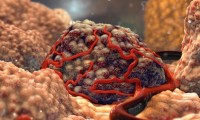-
Culmination Bio and BillionToOne partner to advance cancer diagnosis
- Source: drugdu
- 418
- April 11, 2024
-
US researchers reveal positive results of personalised vaccine for liver cancer
- Source: drugdu
- 289
- April 11, 2024
-
【EXPERT Q&A】What qualifications are required to sell a Class of medical devices?
- Source: drugdu
- 411
- April 11, 2024
-
KOREA PHARM & BIO 2024
- Source: drugdu
- 763
- April 11, 2024
-
Cell Therapy Now Set to Reach More Patients With Expanded FDA Nod for 2 Multiple Myeloma Drugs
- Source: drugdu
- 390
- April 10, 2024
-
Enhertu Gets FDA Accelerated Approval for Unresectable, Metastatic HER2-Positive Solid Tumors
- Source: drugdu
- 471
- April 10, 2024
-
Simple PCR Assay Accurately Differentiates Between Small Cell Lung Cancer Subtypes
- Source: drugdu
- 350
- April 10, 2024
-
First 4-in-1 Nucleic Acid Test for Arbovirus Screening to Reduce Risk of Transfusion-Transmitted Infections
- Source: drugdu
- 356
- April 10, 2024
-
Phase 3 Comparative Clinical Study of Prolia® and Xgeva® (denosumab) Biosimilar Candidate HLX14 Met Primary Endpoints
- Source: drugdu
- 333
- April 10, 2024
your submission has already been received.
OK
Subscribe
Please enter a valid Email address!
Submit
The most relevant industry news & insight will be sent to you every two weeks.

















